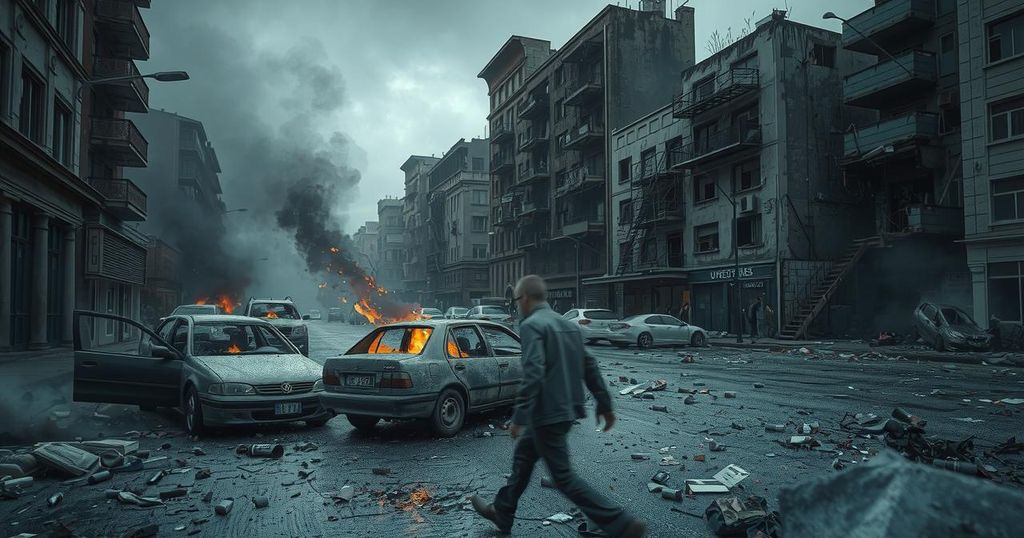Colombia Rocked by Wave of Violence Killing at Least Seven People

Colombia is reeling from a wave of attacks, including bombings and gunfire, that resulted in at least seven deaths. The coordinated violence occurred in Cali and surrounding areas, with police attributing the incidents to a local guerrilla group. The country is increasingly worried about a return to the violent past, following an assassination attempt on a political figure just days prior. The situation illustrates a worsening security crisis and growing concern among citizens.
CALI, Colombia — A wave of violence swept across Colombia on Tuesday, leaving at least seven individuals dead following 24 coordinated bomb and gun attacks. The incidents spanned the country’s southwest region, hitting Cali—Colombia’s third-largest city—and surrounding towns, targeting police stations, government buildings, and civilian locations. The chaos has further exacerbated the nation’s existing security crisis.
According to National Police chief Carlos Fernando Triana, the attackers, believed to be affiliated with a local guerrilla faction, deployed a combination of car bombs, motorcycle explosives, rifle fire, and possibly even a drone in their assaults. “Two police officers are dead and a number of members of the public are also dead,” he confirmed. Police later adjusted the official figures to match with a total of seven fatalities and 28 additional injuries.
In the aftermath, reporters described the grim scene in Cali and nearby towns like Villa Rica and Guachinte, where the remnants of vehicle bombs lay intertwined with charred debris and damaged structures. Just days before these attacks, an assassination attempt on a presidential candidate in Bogotá had already left the country on high alert.
The striking resurgence of violence reminiscent of the traumatic 1980s and 1990s, marked by cartel clashes, guerrilla confrontations, and political killings, has left many Colombians feeling anxious. Interior Minister Armando Benedetti mentioned that the authorities had received unverified information suggesting guerrilla involvement in the attack on Senator Miguel Uribe.
In Corinto, local resident Luz Amparo recounted the devastation when her bakery was destroyed in the explosion. “We thought it was an earthquake,” she shared. “My husband said, ‘no, they are shooting.’” The shockwaves of the blasts prompted her to check on her store, only to find it leveled to the ground.
Experts, including security analyst Elizabeth Dickinson from the International Crisis Group, have pointed fingers at a dissident faction of the formerly influential FARC guerrilla group. She identified the Central General Staff (EMC) as likely orchestrating these attacks. Dickinson emphasized how orchestrated this offensive was, highlighting the group’s significant operational capacity demonstrated during these attacks.
Moreover, Dickinson suggested that these actions might be a response to ongoing government military operations targeting EMC’s leadership, including the group’s veteran leader known as “Ivan Mordisco.” “They are trying to raise the cost of that military initiative for the government,” she stated. In a surprising turn, the EMC issued a public warning to civilians to steer clear of military and police areas, though they refrained from claiming responsibility.
All of this unfolds following a shocking assassination attempt on conservative senator Uribe, who was shot at close range while campaigning in Bogotá. A 15-year-old suspect arrested in connection to the shooting pleaded “not guilty.” Authorities are investigating whether he was part of a more extensive hired gun conspiracy. President Gustavo Petro is facing criticism over his administration’s handling of the escalating violence and the apparent targeting of political figures. He even took to social media suggesting the hit might have been ordered by an international “mafia.” This recent spate of violence only adds to the uncertainty surrounding Colombia’s fragile peace efforts.
The violence in Colombia, characterized by bombings and gunfire across multiple areas, underscores a dangerous escalation in the ongoing security crisis the nation faces. The attacks not only resulted in tragic losses of life but also triggered fears of a return to the violent past of the late 20th century. The implications of these actions are far-reaching, particularly in the context of ongoing military operations against guerrilla factions and the influence of organized crime. As Colombians grapple with this resurgence of violence, the government’s strategies and responses will likely be scrutinized more than ever.
Original Source: globalnation.inquirer.net







